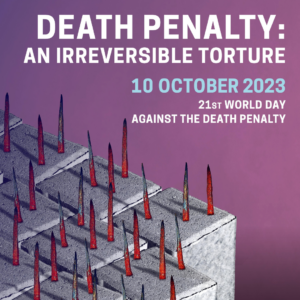
UK judges uphold death sentence of Trinidad prisoner despite him “more likely than not” having serious mental illness
- News
- 14 Mar 2018
The Judicial Committee of the Privy Council (JCPC) has rejected the appeal of death row prisoner Jay Chandler, despite new psychiatric evidence that he was “more likely than not” in a psychotic state at the time of the killing for which he was convicted.
The majority decision of the JCPC, which remains the highest court of appeal for Trinidad and Tobago, raises serious concerns about the court system’s protection of individuals with mental disorders in capital cases. In an unusual step, two of the five judges who heard the appeal have written a powerful dissent.
Jay Chandler was convicted and sentenced to death for a prison murder 14 years ago. In neither of the two trials that he faced was the issue of his mental health ever considered by the court. It was only when he approached The Death Penalty Project after years on death row that a full psychiatric assessment was conducted – making the stark finding that Chandler was “more likely than not” suffering from psychosis at the time of the offence.
The new psychiatric evidence supports a case of “diminished responsibility”: that by reason of his mental illness, Chandler was not fully culpable for his actions. By the law of Trinidad and Tobago, he would be liable for manslaughter not murder, and he would not have faced the death penalty. But that evidence was never before obtained, and never presented to the trial court nor to the Court of Appeal.
There was no evidence before the JCPC to explain why Chandler’s mental health was not assessed and diminished responsibility not argued before the trial court, as this information was not available. Nevertheless, Lord Carnwath’s majority judgment upholding the death penalty relied on the fact that “there is no evidence that the failure to advance a case of diminished responsibility at the trial was anything other than deliberate”. Thus, despite unchallenged expert evidence of a serious mental disorder, because of the mere possibility that it had been a tactical decision at trial not to rely on Chandler’s mental illness, the majority considered it appropriate to uphold a sentence of death.
That conclusion is deeply concerning – not just for Jay Chandler, who will now stay on death row despite evidence that he should never have faced the death sentence in the first place – but also for other mentally ill suspects accused of capital crimes in jurisdictions where funding for mental health assessments is often not available. When these issues are missed at trial, the role of the appellate courts is to ensure that the rights of prisoners are properly protected. The majority has failed in that duty here.
Real concerns about the majority decision have also been expressed by Lord Kerr and Lord Lloyd Jones who, in a step highly unusual in criminal appeals, published a judgment dissenting from their colleagues. They observed that it was improper for inferences to be drawn against the appellant, particularly as to whether a deliberate decision was made at trial not to lead evidence on his mental health, in circumstances where he “plainly does have a viable defence on the grounds of diminished responsibility”. Both Lord Kerr and Lord Lloyd Jones would have allowed the appeal and remitted the case back to the courts of Trinidad and Tobago so that the question of Chandler’s mental illness and its impact on the offence could be properly explored.
International law clearly prohibits the imposition of death sentences on individuals with mental disorders. Where there is cogent evidence, from a leading expert, that a death row prisoner “more likely than not” suffers from such a disorder, the courts must pay heed to that evidence to ensure that no-one languishes on death row without all the proper protections being applied. The majority decision flies in the face of international law and the JCPC’s own prior judgments. It denies the courts of Trinidad and Tobago the opportunity of properly considering the issue, and it leaves a seriously unwell man with a capital conviction.
Notes to Editors
Jay Chandler was represented pro bono by Tim Owen QC, Joanna Buckley and Jessica Jones of Matrix Chambers. Forensic psychiatrist Professor Nigel Eastman also provided pro bono assistance in this case.




















